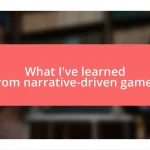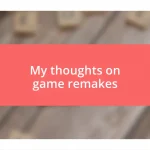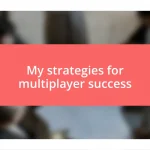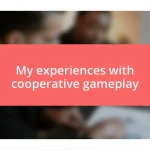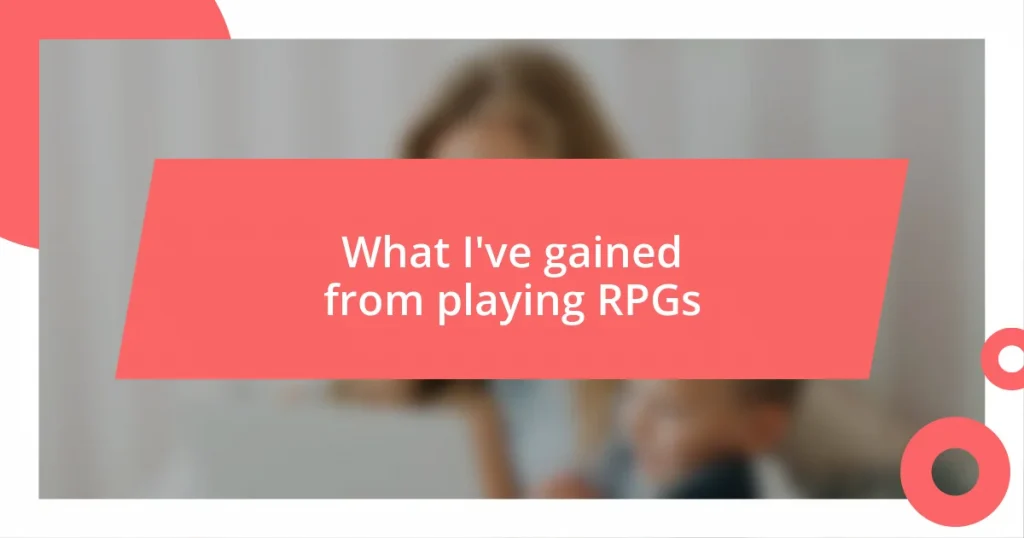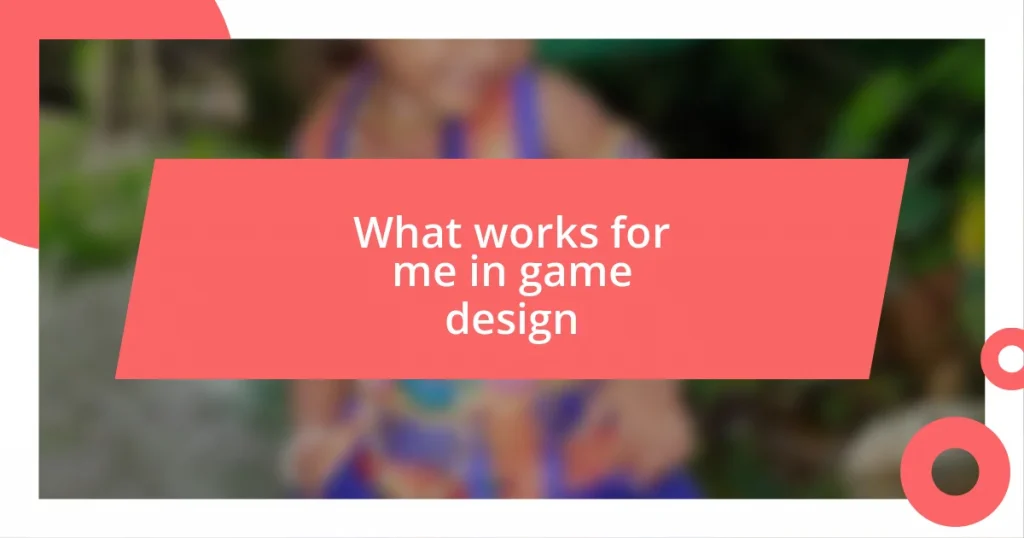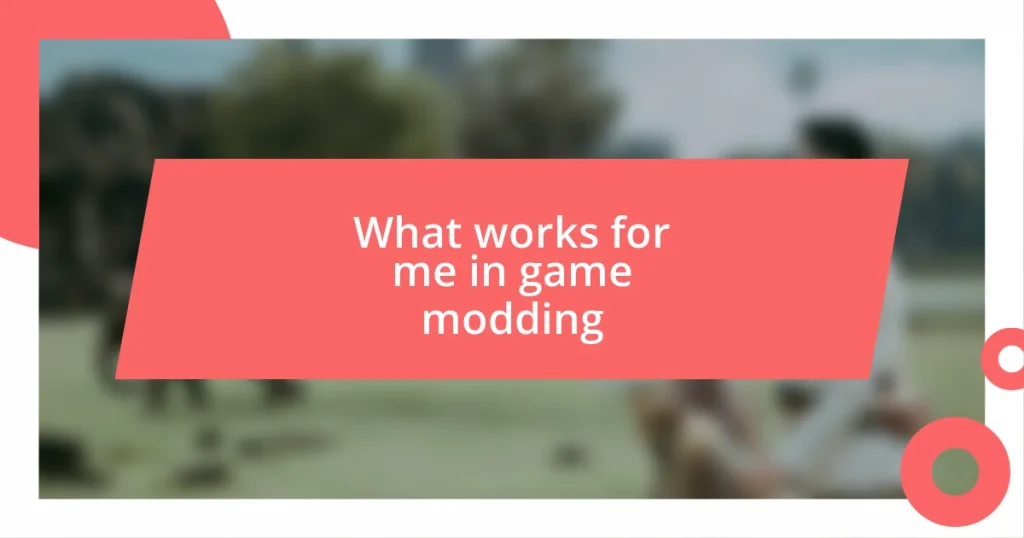Key takeaways:
- RPGs enhance critical thinking and problem-solving through collaborative strategy and creative solutions, shaping real-life decision-making skills.
- By stepping into diverse character roles, players develop empathy and emotional growth, fostering deeper connections and understanding of others.
- The gaming experience encourages adaptability and resilience, teaching players to embrace change, learn from failures, and strengthen bonds through shared challenges.
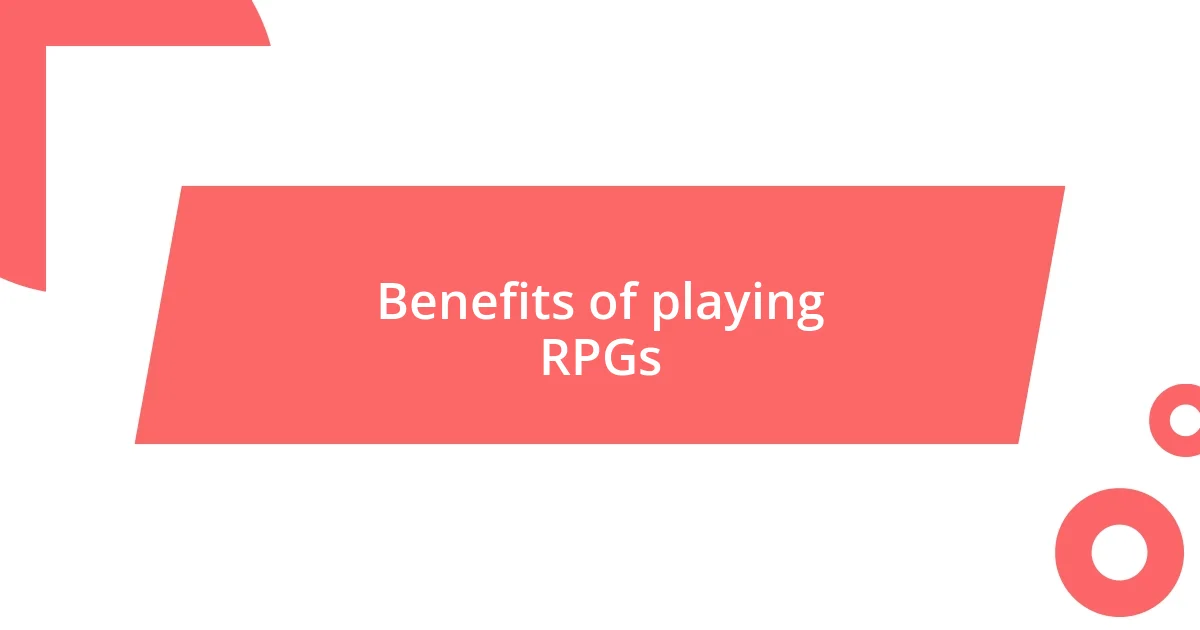
Benefits of playing RPGs
Diving into RPGs has enriched my problem-solving skills in ways I never anticipated. I remember a campaign where we faced a seemingly insurmountable challenge—a dragon, of all things! It forced our group to think outside the box, strategizing and collaborating like never before. The thrill of piecing together solutions with friends not only enhanced my Critical Thinking skills but also strengthened our bonds.
Another profound benefit I’ve experienced through RPGs is the nuanced understanding of different perspectives. Stepping into the shoes of diverse characters—whether a brooding rogue or a wise old wizard—has expanded my empathy. Have you ever felt a character’s pain when they suffered loss in-game? It’s a unique emotional connection that teaches me to appreciate the complexities of people in real life, fostering a sense of compassion that extends beyond the gaming table.
Lastly, RPGs have provided me with a creative outlet that’s been absolutely invaluable. I recall one session where I crafted an entire backstory for my character, pouring my heart into their struggles and triumphs. Sharing that story with my fellow players and weaving it into our larger narrative ignited a passion for storytelling that I carry with me today. Isn’t it fascinating how a hobby can transform into a profound source of creativity?
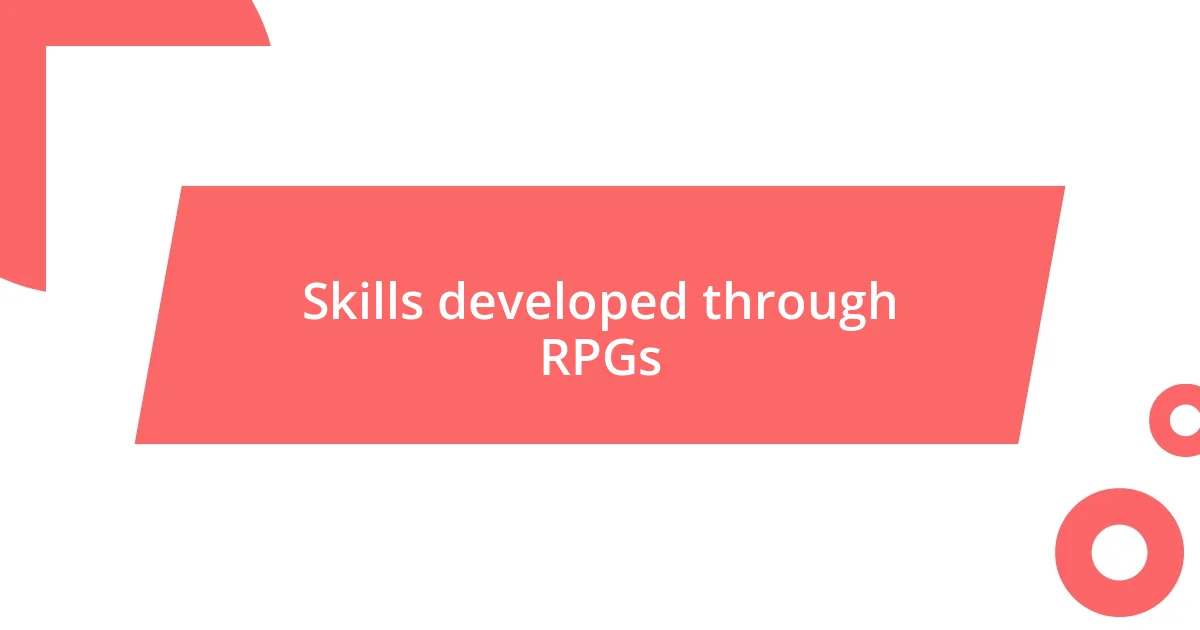
Skills developed through RPGs
Engaging in RPGs has significantly honed my teamwork and communication skills. I vividly remember a session where our group’s faction was deciding how to approach an enemy stronghold. All of us had different ideas—some wanted stealth, others preferred a direct assault. Through discussions, debates, and a bit of compromise, we developed a cohesive strategy that not only involved everyone’s input but also sparked new friendships. It was a clear moment where I realized how vital effective communication is, both in-game and in life.
Here are some of the skills I’ve developed through playing RPGs:
- Critical Thinking: Analyzing different scenarios and making decisions under pressure.
- Teamwork: Collaborating with others to achieve common goals, navigating diverse personalities.
- Adaptability: Adjusting strategies quickly when faced with unexpected challenges.
- Creativity: Crafting stories and characters, tapping into my imaginative side.
- Empathy: Understanding and connecting with various character motivations and experiences.
Each of these skills extends beyond the game, shaping the way I approach challenges in real life.
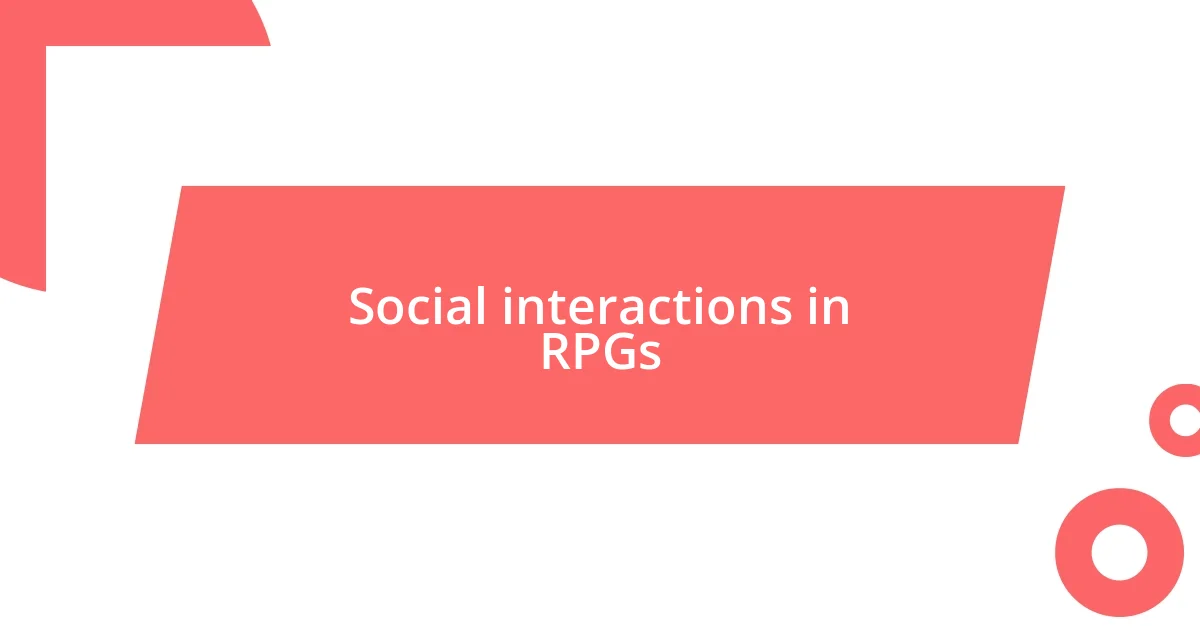
Social interactions in RPGs
The social interactions in RPGs have truly transformed how I relate to others. There’s something magical about gathering around a table, creating stories together, and sharing laughs and even the occasional tear. One memorable night, we encountered a situation where our party had to choose between saving a town from marauding goblins or pursuing a powerful artifact. The discussion became heated, with differing opinions flowing like a river. Through that debate, I realized that each player’s passion added depth to our story and strengthened our friendships.
What stands out for me is how RPGs cultivate a safe environment for communication. I’ve found that sharing my thoughts and ideas within this gaming space has often encouraged me to express myself more openly in real life. In one campaign, I played a bard whose charisma was put to the test during negotiations. The playful banter and encouragement from my friends built my confidence, allowing me to embrace vulnerability in both the game and outside of it, bridging the gap between fantasy and reality.
Through these experiences, I’ve built enduring friendships that I’ll cherish for years to come. I’ve learned that the struggle and triumph of working together towards a goal translates to real-life cooperation. Every small victory we achieved as a party—the laughter over a critical hit or the shared sigh when a plan backfired—added a layer of camaraderie that has enriched my life far beyond the game. The bonds formed in these fictional worlds have proven to be as genuine and substantive as those in everyday life.
| Aspect of Social Interaction | Example from My Experience |
|---|---|
| Team Collaboration | Debating our approach to a stronghold led to new friendships and strategies. |
| Vulnerability | Playing a bard helped me express myself more openly among friends. |
| Lasting Bonds | Shared victories and failures in-game strengthened real-life relationships. |
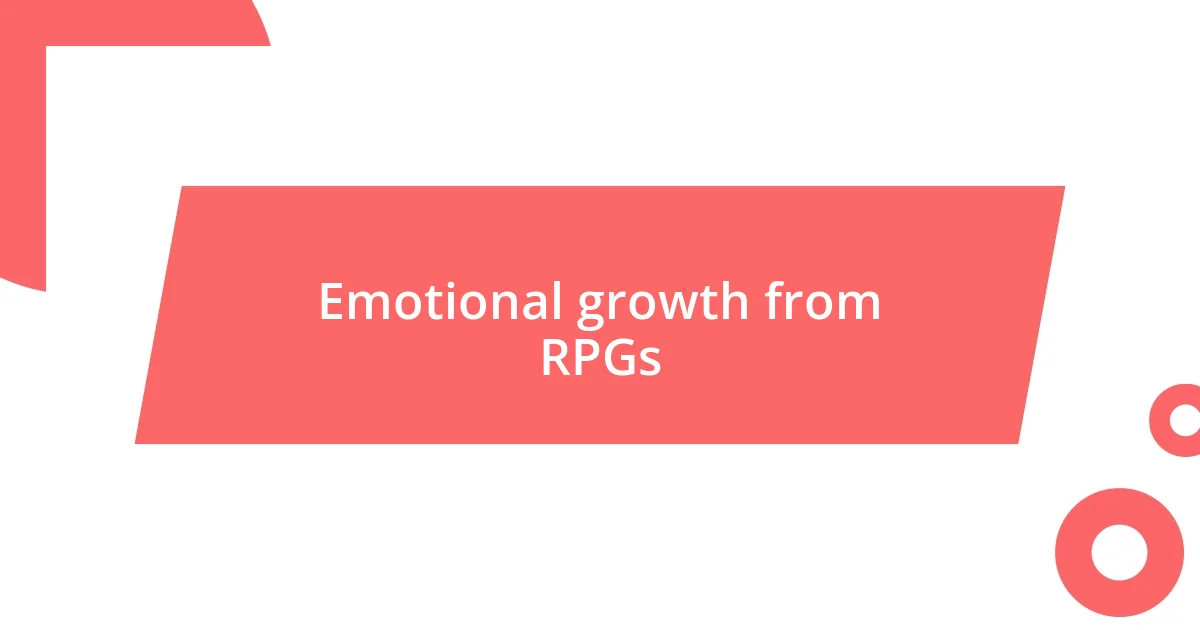
Emotional growth from RPGs
Diving into RPGs has been a profound journey for my emotional growth. Playing a character with a troubled past forced me to confront my own vulnerabilities. I recall a session where my character faced tremendous loss, and it brought tears to my eyes. That moment ignited a realization: acknowledging pain can lead to healing. Isn’t it fascinating how stepping into someone else’s shoes can help us better understand our own emotions?
I often find myself reflecting on how these narratives have shaped my empathy. By experiencing the struggles of characters—each with their motivations and heartaches—I’ve cultivated a deeper connection to real-life situations. For instance, when my party member’s character made a self-sacrificial choice, I felt the weight of that decision. It reminded me of the importance of support and sacrifice in my friendships. This emotional involvement isn’t just about gaming; it reflects back on how I interact with loved ones.
Moreover, RPGs challenge me to embrace change and uncertainty. Characters evolve through their experiences, and I learned from their journeys. One time, I played a character who started as a determined warrior but gradually became more introspective after facing moral dilemmas. This transformation mirrored my own life challenges, pushing me to engage with conflicts head-on rather than shy away. Have you ever found solace in a character’s journey that nudged you to change yourself? That’s the beauty of RPGs; they don’t just offer immersive worlds; they also provide avenues for self-discovery and growth.
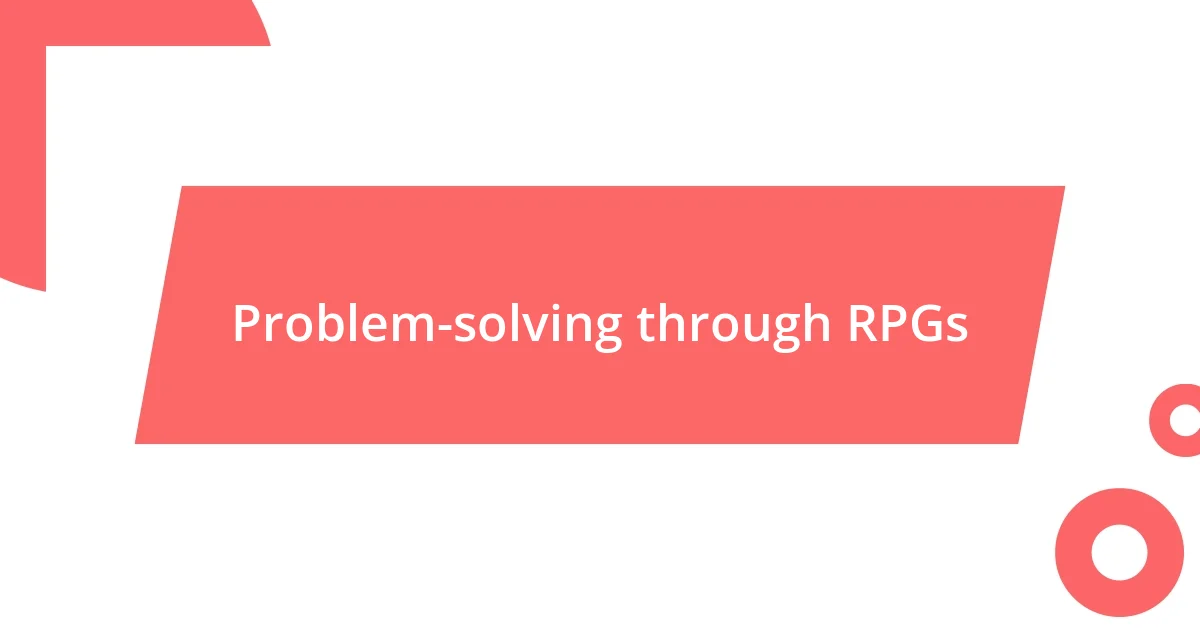
Problem-solving through RPGs
When it comes to problem-solving, RPGs serve as an engaging playground for honing critical thinking skills. I vividly remember a campaign where our party faced a formidable dragon blocking our path. Instead of charging in blindly, we had to brainstorm options, weighing risks against rewards. It was during this process that I truly appreciated the value of collaboration; each player brought unique perspectives, resulting in a creative solution that we could never have reached alone. How many times in daily life do we brush past the possibility of gathering diverse opinions to tackle challenges?
Another standout moment was when we encountered a puzzle that required deciphering ancient runes to unlock a sealed door. I felt a sense of urgency and excitement as our team pooled our knowledge—some remembered trivia from past sessions, others had research they’d done in advance. The thrill of piecing the solution together was incredibly satisfying, much like cracking a complex code in real life. I often reflect on moments like these, realizing that skills developed in RPGs—patience, teamwork, and lateral thinking—have enriched my approach to problem-solving outside the game.
Moreover, RPGs allow me to embrace failure in a safe space, turning setbacks into valuable learning experiences. There was a time when our team’s strategy went completely awry, leading to chaos and almost certain defeat. Instead of despair, we found humor in our mistakes. This taught me to analyze what went wrong without fear of judgment, and I’ve carried that lesson into real-world situations. After all, isn’t it refreshing to know that not every solution needs to be perfect? Embracing imperfection often leads to the most unexpected and rewarding outcomes.
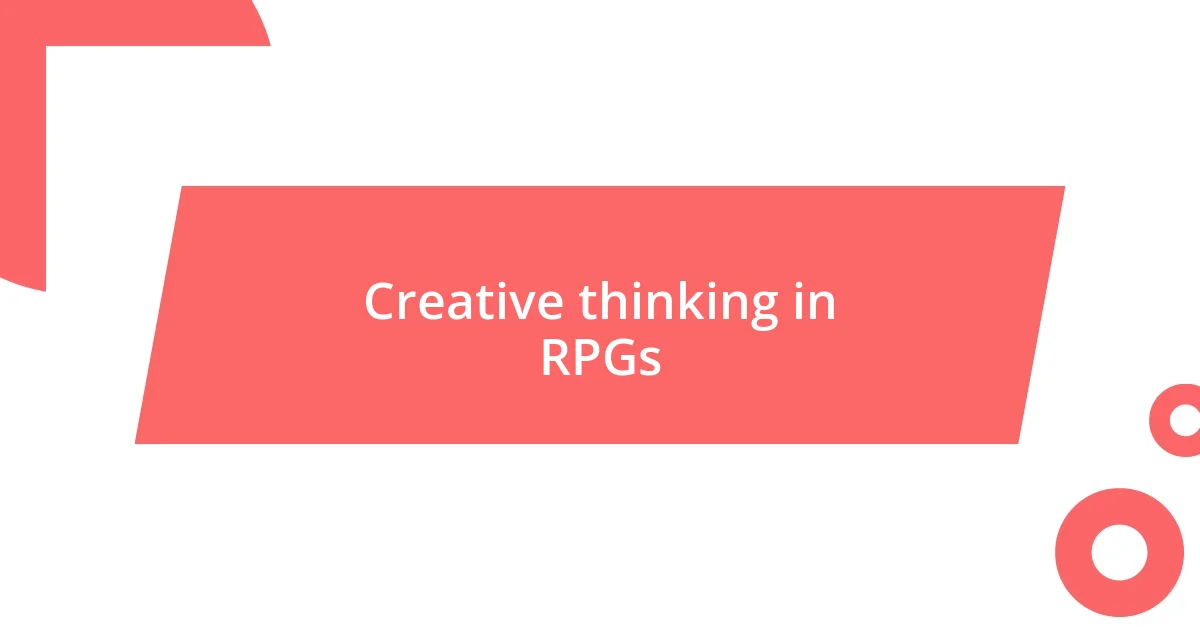
Creative thinking in RPGs
Playing RPGs has truly opened up a wellspring of creative thinking for me. There’s a moment I can’t forget, where I played a bard whose improvisation skills were put to the test. Faced with a villain’s threat, instead of fighting, I decided to charm our way out of trouble with a song. Not only did it turn the situation around, but it made me realize that creativity often flourishes under pressure. Isn’t it amazing how stepping outside conventional solutions can lead to unexpected victories?
In another campaign, I embraced world-building, where every small detail mattered. I vividly recall sketching out maps and inventing folklore for a region my character hails from. This process made me think about how cultures form and evolve in our world. It sparked a realization: creativity isn’t just about invention; it’s also about connecting dots in ways that feel authentic. How often do we take the time to explore the backstories of our own lives, weaving them into the fabric of our experiences?
What I truly cherish is how RPGs encourage collaboration in creativity, too. I remember a session where our group devised a heist to outwit a corrupt nobleman. Each of us contributed unique ideas; a stealthy rogue paired with a charming diplomat and a strong warrior made the perfect team. Reflecting on this, I’ve learned that when we combine our imaginations, the possibilities are limitless. Isn’t it wonderful how creative thinking can flourish in a supportive environment? It’s taught me that, both in games and in life, collaborating with others can lead to richer, more vibrant ideas.
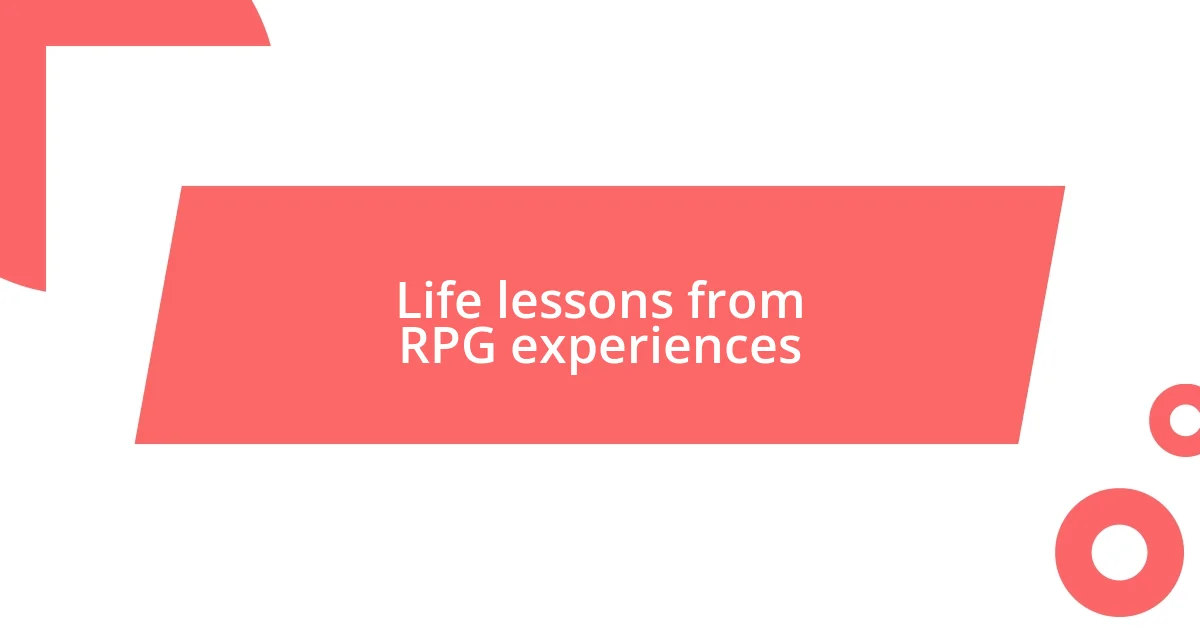
Life lessons from RPG experiences
I’ve learned that one of the most vital life lessons from RPGs is the importance of adaptability. During one campaign, my character, a wizard, faced an unexpected betrayal from an ally. Instead of freezing in fear or despair, I had to quickly pivot my strategy and leverage my spells in a totally unconventional way. That moment reminded me of how essential it is to remain agile in life—sometimes, circumstances shift in a heartbeat, and it’s our flexibility that keeps us moving forward. How often do we cling to our original plans, even when they no longer serve us?
Another lesson I’ve taken to heart is the notion of empathy. With each character I create, I find myself stepping into their shoes, understanding their backgrounds, fears, and desires. I recall a session where my character had to decide whether to spare a defeated enemy. As I weighed the consequences, I realized that empathy is not just about feeling for someone but also about recognizing the impact of our choices on others. It’s a lesson that echoes powerfully in my everyday interactions. How can we cultivate deeper connections if we don’t strive to understand those around us?
Lastly, RPGs have instilled in me a profound sense of resilience. I still remember a grueling session where our whole party was knocked out in a battle. Instead of succumbing to frustration, we regrouped, analyzed what went wrong, and came back stronger than ever in our next session. This experience taught me that resilience isn’t just about bouncing back but is also about learning from failures and using those lessons to forge ahead. Isn’t it remarkable how facing challenges together can strengthen our bonds and resolve?



